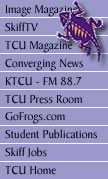
|
Education exchange When
Tine Kofoed and Trine Boding performed “The Itsy Bitsy Spider,”
they played to a captive audience. Toddlers
at the Rise School watched with fascination as Kofoed and Boding
crouched in front of them and turned their grown-up hands into imaginary
spiders. Kofoed
and Boding are students from Denmark who came to work with the School
of Education as part of an exchange program through the European
Teacher Education Network. TCU
joined the network in fall 2001 to extend international opportunities
for students and faculty, said Samuel Deitz, dean of the School
of Education. He said part of TCU’s mission is to foster a
global community and that being a part of the network helps achieve
that. “I
think students come back much more thoughtful about how education
works and what it takes to educate a student,” he said. The
network began in Europe about 14 years ago as a way for education
students and faculty to better understand different languages and
cultures by studying abroad, said Jay Thompson, treasurer of the
network and a professor at Ball State University in Muncie, Ind.
TCU is one of four American universities to have membership in the
network, Thompson said. Since
joining the network, TCU has sent one student and one teacher abroad
and received three students from Denmark, said C. Dale Young, career
planning and placement director. TCU has also hosted one teacher
from Holland, he said. Juliana
Heflin, a senior education major, studied in Denmark last semester
as a part of an exchange program. “It
was an amazing adventure to go around on my own and to conquer the
unknown and explore new places,” Heflin said. Ranae
Stetson, an associate professor of education, said she traveled
to Holland to teach other educators how to use technology with young
children. “It’s
an awesome experience ... a wonderful professional growth opportunity,”
Stetson said. Kofoed
and Boding said they are studying to be social educators in Denmark
and want to work with Down syndrome children. The biggest difference
they noted between education for children with Down syndrome in
Denmark and the United States is that school for the children does
not begin until they are 7 years old in Denmark but starts at 18
months here, Boding said. She
said she hopes to gain many new ideas from working with the Rise
School and that she wants to offer some ideas to the teachers here
too. Kelly
Moreland, a senior early childhood education major, said she doesn’t
know much about what her teaching experience will be like, so she
is preparing for this trip by student teaching in Fort Worth. “Since
this will be the first group to ever go to Denmark to student teach,
I am sure there are going to be a few little glitches here and there,”
Moreland said. “Just being in the classroom all day with the
same group of children is helping me feel more comfortable in the
teaching position and giving me the confidence that I need to go
to a foreign country.” This
February, five education faculty members will travel to The Netherlands
to share their teaching techniques at an annual network meeting,
Young said. Deitz said he hopes to increase student exchanges as
a result of the meeting. Thompson
said belonging to the network will offer TCU an opportunity that
will have a dramatic impact on students and faculty. “(The
network) has opened up Europe for students and faculty members for
exchanges, research and collaboration that is essential in the world
we live in today,” Thompson said. “Both students and faculty
have developed greater cultural understandings and appreciation
resulting from the friendships that have been created.” Lauren
Hanvey |
|
|
TCU Daily Skiff © 2002 |
||
